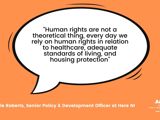Article 3 issues may arise if the State fails to protect people from violent hate crime.
An LGBT charity in Georgia held a peaceful protest in the capital city to mark the International Day Against Homophobia. Two religious groups and around a hundred other people turned up to counter-protest. They surrounded members of the LGBT charity and threatened and insulted them before physically assaulting them. A bystander asked the police to intervene but he was put in a police car and detained at the station. The police said they did this to protect him from the counter-protestors. The European Court of Human Rights said that the police had failed to meet their positive obligations to protect the LGBT group members from inhuman or degrading treatment, and failed to carry out an investigation into the incidents afterwards, which breached their Article 3 rights.



